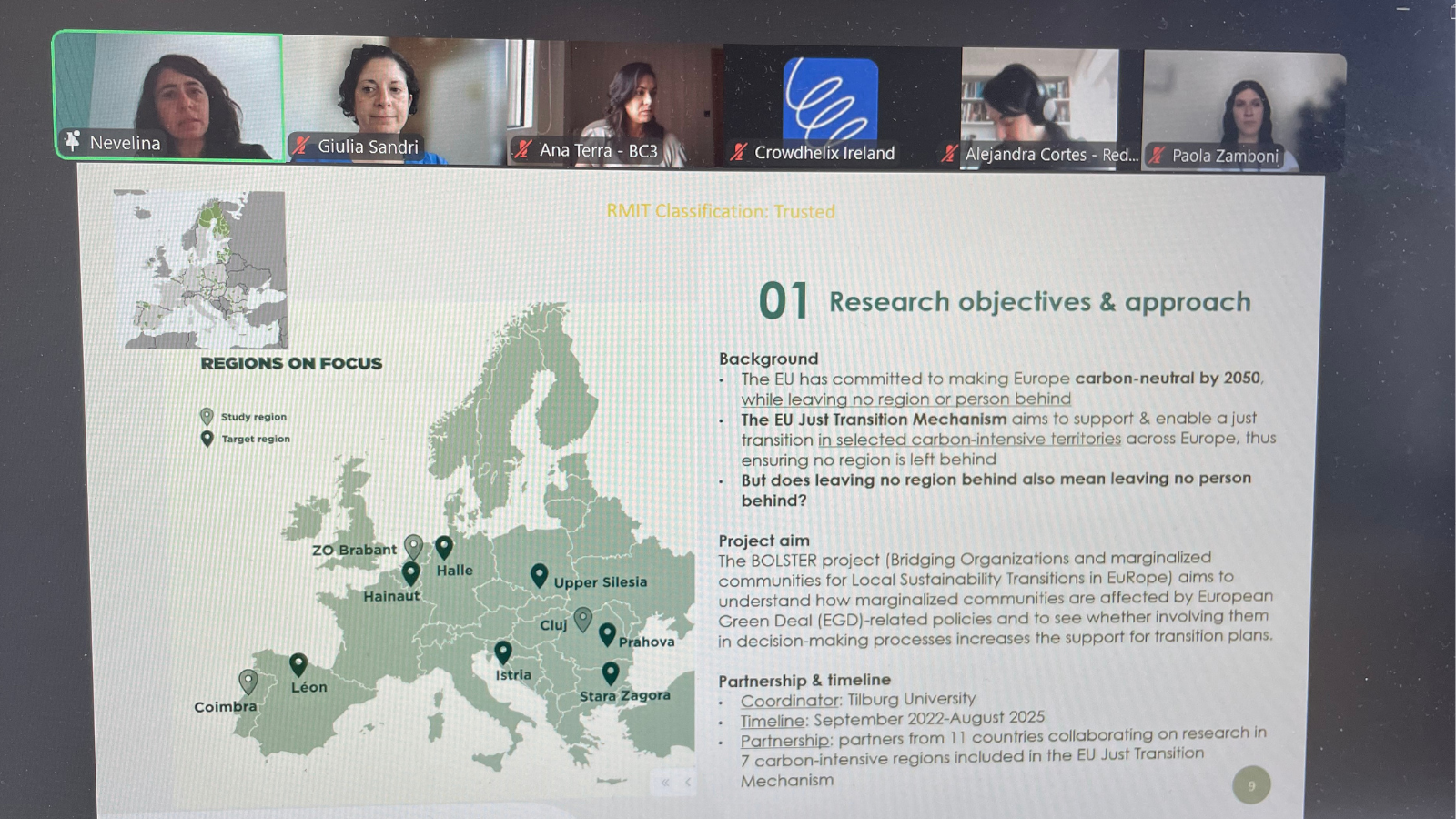Home>News>Inclusive Just Transition Policies in Europe and Beyond

On June 30, 2025, the BOLSTER project hosted its 10th Policy Dialogue titled “Inclusive Just Transition Policies in Europe and Beyond,” aiming to foster an inclusive approach to sustainable transitions within marginalised communities. The event, organised jointly by ECAS and Crowdhelix, brought together international experts who presented diverse case studies, emphasising the importance of engaging marginalised groups in sustainability and climate policy initiatives.
Dr. Nevelina Pachova from RMIT Europe introduced the overarching objectives of the BOLSTER project, highlighting the discrepancies in priorities between official Just Transition policies (JTP) and marginalised communities. Pachova emphasised participatory action research as a vital tool for integrating marginalised voices into decision-making processes. Key findings showed marginalised communities prioritise basic needs such as affordable housing, energy access, and transportation, in contrast to the European Union’s broader industrial innovation and energy transition agenda.
Professor Emilie Dupuits from the Universidad San Francisco de Quito presented a participatory initiative for the conservation of the Caoní River in Ecuador. This grassroots project included community-based monitoring of endangered species and water quality, highlighting the necessity of local governance and citizen participation to effectively protect ecological resources. Dupuits recommended strengthening community actions and advocated for international cooperation to sustain conservation efforts.
Dr. Alejandra Cortés Fuentes from the Universidad de Chile shared insights from a Local Energy Strategy (LES) project conducted in Lago Verde, Patagonia, Chile. Cortés Fuentes outlined the severe energy poverty and isolation challenges faced by rural communities. She emphasised the importance of tailored solutions, community engagement, and sustained financing. Her recommendations included establishing monitoring frameworks and ensuring equitable access to high-quality energy services.
Dr. Ana Terra Amorim-Maia from the Basque Centre for Climate Change (BC3) discussed the IMAGINE Adaptation project in Rosario, Argentina. Her research underscored the intersectionality of climate vulnerability, revealing how socio-economic, political, and historical factors disproportionately impact marginalised groups. Amorim-Maia advocated for adaptive solutions tailored to local contexts, stressing the necessity of intersectional planning to effectively address urban vulnerabilities and foster inclusive resilience.
Dr. Mauro Pucheta from the University of Kent discussed the Just Transition within the context of informal workers in Latin America. He highlighted the Inter-American Framework’s progressive jurisprudence, emphasising labour and environmental rights. Pucheta stressed the significance of incorporating informal workers into formal just transition dialogues and frameworks, recommending inclusive policy designs that ensure fair representation and participation of vulnerable worker groups.
Lorena Zenteno Villa, PhD Candidate at the University of Miami School of Law, introduced the concept of Just Transition litigation, which examines the fairness of distributing benefits and burdens resulting from climate transition policies, emphasising inclusive, rights-based approaches. She highlighted significant Latin American cases, such as the Supreme Court of Chile’s decision mandating workforce reinsertion to achieve carbon neutrality, and the Zapoteca community’s case in Mexico against Electricité de France, emphasising indigenous communities’ right to equitable access to renewable energy.
Anastasiia Bushovska from Ecoaction Ukraine discussed civil society’s role in facilitating just transitions in coal-dependent regions. Bushovska emphasised that effective transition requires active participation and capacity building within local communities. She shared Ecoaction’s successful strategies, including workshops, community-led projects, and advocacy efforts, underscoring the importance of local empowerment and bottom-up governance to achieve sustainable regional transformations.
The dialogue concluded with overarching policy recommendations advocating for a strengthened Just Transition that addresses political polarisation, supports local NGOs, promotes inclusive governance, unlocks regional potentials for reindustrialisation, and improves funding effectiveness. Participants agreed on fostering local ownership and integrating marginalised voices into transition plans to ensure equitable and lasting impacts.
The event served as a critical platform for sharing international experiences, reinforcing the need for inclusive governance structures and locally-adapted strategies to ensure that sustainability transitions effectively reach marginalised and underserved communities.
"*" indicates required fields
Информационната кампания за кандидатстване по фонд „Партньорство“ на проект „ПАКТ“ привлече над 300 представители на граждански организации в рамките на шест информационни дни и седем уебинари. Срещите бяха фокусирани върху […]
The information campaign supporting applications under the “Partnership” Fund of the PACT project successfully engaged more than 300 representatives of civil society organisations through a series of six information days […]
ПВ рамките на информационната кампания по фонд „Партньорство“ по проект „ПАКТ“ предстои провеждането на серия от уебинари, насочени към представяне на насоките за кандидатстване, както и към задълбочаване на ключови […]

